Introduction: This is the third in a series of Film Annex interviews with Nancy Hatch Dupree, the legendary American adventurer, author, historian and founder of the Afghanistan Centre at Kabul University (ACKU). 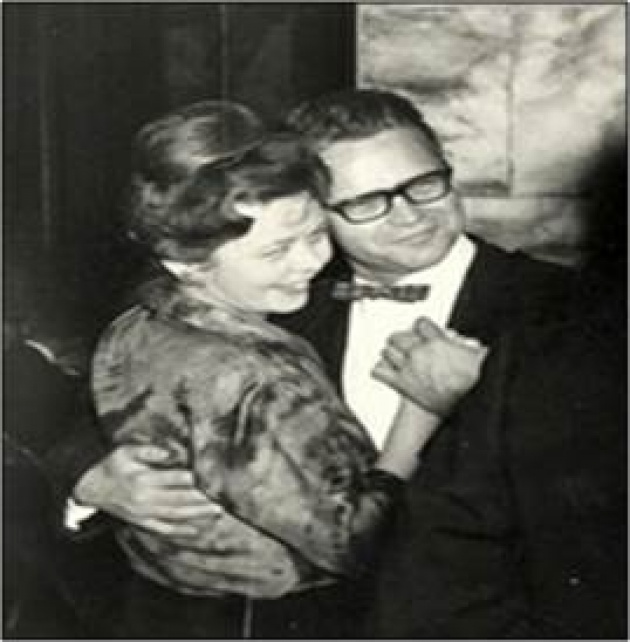
Nancy Dupree has been a real-life legend in Afghanistan for 50 years. She has dedicated herself since 1962 to documenting and preserving Afghanistan’s cultural heritage.
Her life’s work, and that of her late husband Louis Dupree, has culminated in today’s ACKU and a state-of-the art new ACKU facility in the final stages of construction on the campus of Kabul University. The new facility is near enough completion that ACKU has already held several public events there. Its formal opening is scheduled for March 27, 2013.
Nancy and Louis Dupree in Kabul, 1966
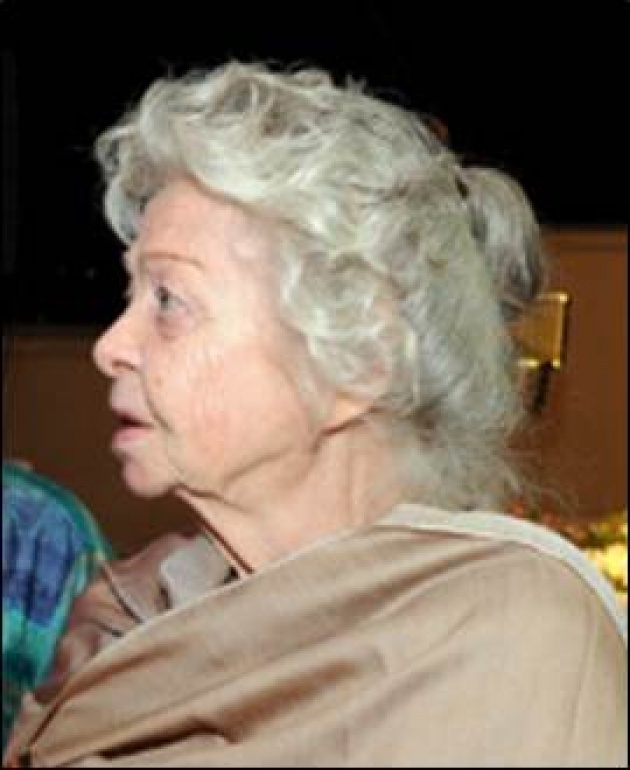 The story of ACKU began in the early 1960’s, when the young Nancy Dupree was in Kabul as an author writing guidebooks on Afghanistan. In the course of her work she met the ex-paratrooper, archaeologist, historian and professor Louis Dupree. They married in 1966.
The story of ACKU began in the early 1960’s, when the young Nancy Dupree was in Kabul as an author writing guidebooks on Afghanistan. In the course of her work she met the ex-paratrooper, archaeologist, historian and professor Louis Dupree. They married in 1966.
Working and traveling together through several decades, they became famous throughout Afghanistan and internationally for their archaeological work, their prolific writing, and their efforts to understand, document and explain Afghanistan’s history and culture.
Nancy Dupree, 2012
Nancy Dupree speaks here again with U.S. Navy Captain Edward Zellem, author of “Zarbul Masalha: 151 Afghan Dari Proverbs" and the "Afghan Proverbs Illustrated" series.
-----
Film Annex: Mrs. Dupree, it’s great to continue learning about the Afghanistan Centre at Kabul University (ACKU). The road ACKU has traveled to get here reminds us of the famous Afghan Proverb “Qattra qattra daryaa mey-sha” قطره قطره دریا میشه (A river is made drop by drop.) With the opening of the new ACKU building, it sounds like the river just got a lot bigger.
Nancy Hatch Dupree: It’s a pleasure to talk with you again too, Captain Zellem. We are now at the culminating point of several years of planning and construction on the new ACKU facility. Many challenges still lie ahead, but by “making the river drop by drop,” as you say, we shall forge ahead. One must acknowledge as a major asset the deep personal commitment of the ACKU staff, who have cheerfully overcome so many difficulties during our transition period and our move into the new building.
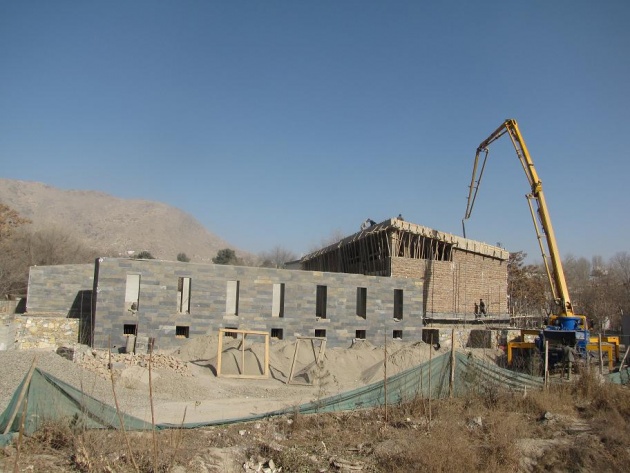
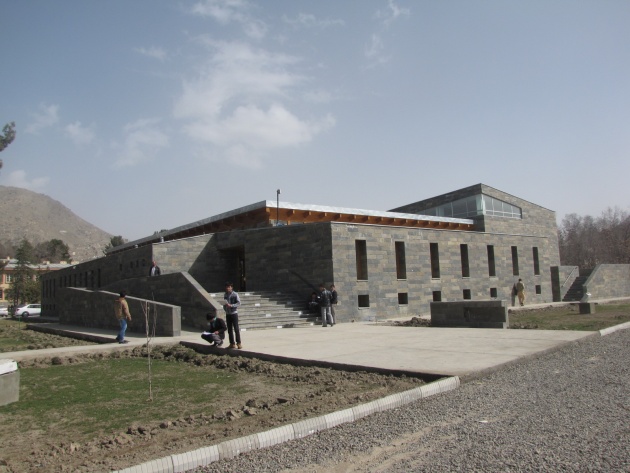
Under construction in 2010 Nearing completion in late 2012
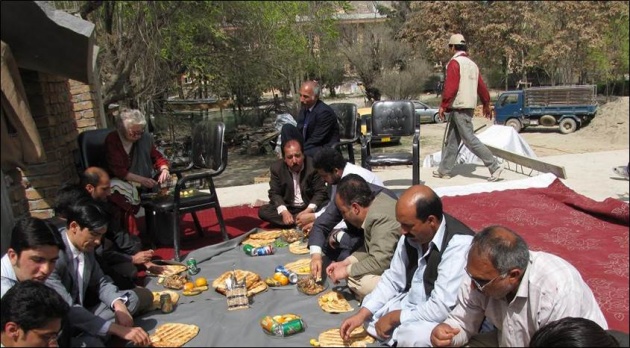
Nancy Dupree and ACKU staff share a meal with construction workers
FA: Is it true that the new ACKU building was largely a project by Afghans, for Afghans, and that the Government of Afghanistan provided land and funding for it?
NHD: That’s right. In January 2013 Afghanistan’s Ministry of Higher Education and ACKU signed a Memorandum of Understanding defining the reciprocal relationship between Kabul University and ACKU. It states that in return for the Afghan Government’s generous allocation of the site on the KU campus and provision of security, ACKU will operate as an independent center that provides access to research materials and training modules for Afghan students and researchers. The possibilities are endless as long as the vision remains creative. The Afghan Government gave us the funds to build the new facility, and the Swiss generously helped with the expenses of architects and architectural supervision.
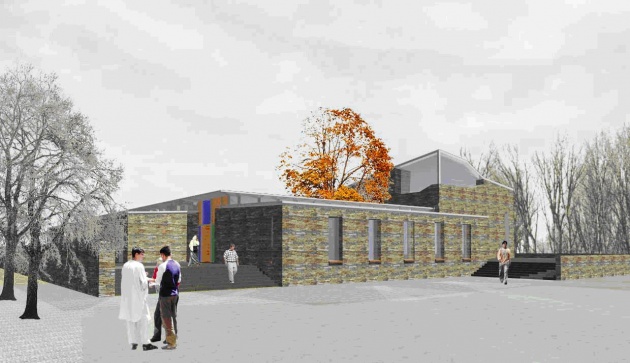
An artist's rendering of ACKU's new building, opening on March 27
FA: That’s wonderful. The new building combines some very fine building materials from Afghanistan with a unique architectural vision. Can you describe the new ACKU building for us? It sounds like the physical manifestation of the future of ACKU and your work.
NHD: It certainly is. The building stands at the heart of the Kabul University campus on a 5,700 square meter site originally identified by Dr. Sharif Fayez, a former Minister of Higher Education. Architecturally it is very modern, while at the same time embodying traditional Afghan concepts about the utilization of space. Its stout outer walls are made of a type of local black slate called “Sangi-Maidan Shahr” (Maidan Shahr stone) after its place of origin near Maidan Shahr, the capital of Wardak province, about an hour’s drive south of Kabul.
These walls have been left with their original rough surfaces, while the interior flooring is paved with polished black and white stone. The columns and beams surrounding an inner courtyard are made from Himalayan cedar from the eastern province of Kunar. Another stunning feature is an extensive use of clerestory windows that flood the building with light.
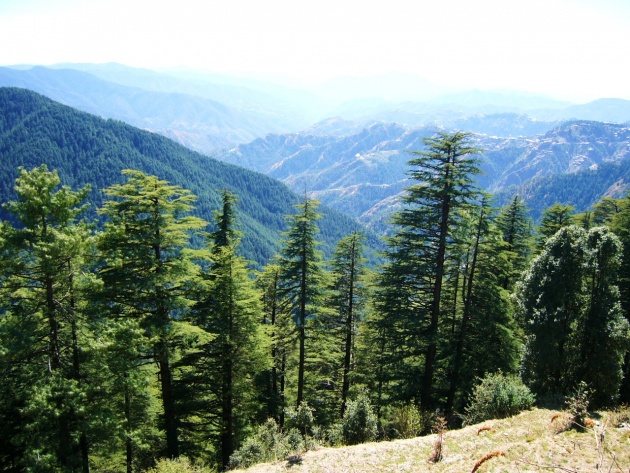
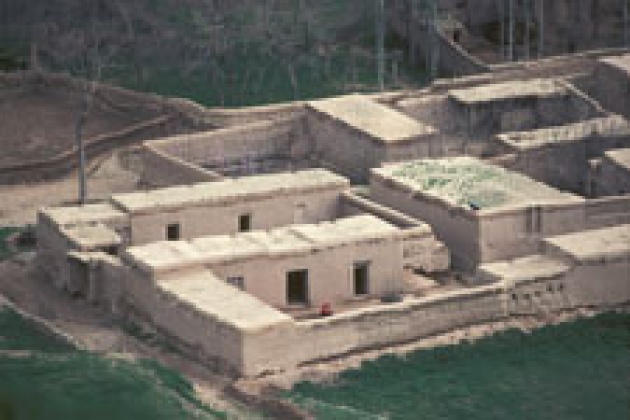
A Himalayan cedar forest in Kunar A traditional Afghan home
Thus, the design is inspired by the traditional architectural style of private extended-family homes found throughout Afghanistan. The building looks inward from its protective outer walls onto a central courtyard where most family interactions take place. In other words, the courtyard is not just a pretty addition to the building.
We expect the courtyard to encourage academic interchanges between students, students and professors, and Afghan academic researchers and their visiting foreign counterparts. They all can engage in meaningful interactions “over a cup of tea” from the nearby tea room.
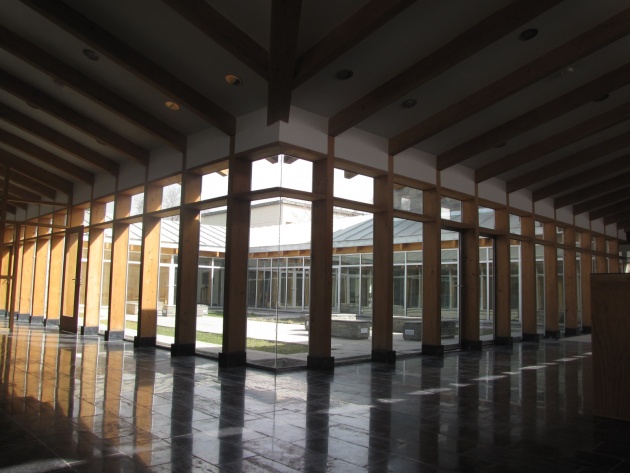
The new ACKU building's central courtyard is inspired by traditional Afghan family-home architecture, seen here through columns of Himalayan cedar
FA: It sounds lovely. Can you tell us more about the interior layout?
NHD: The building has two levels. The spaces on the upper level around the courtyard contain offices and a room leading into the courtyard for workshops, video dialoging, and exhibitions of all sorts. A spacious Reading Room is also located on the upper level with twenty-five internet-enabled computers for access to the database from which documents may be requested from the stacks. Here there also is a separate section for viewing ACKU’s extensive audio-visual materials. In addition, there is a separate, more private Reading Room for long-term researchers. 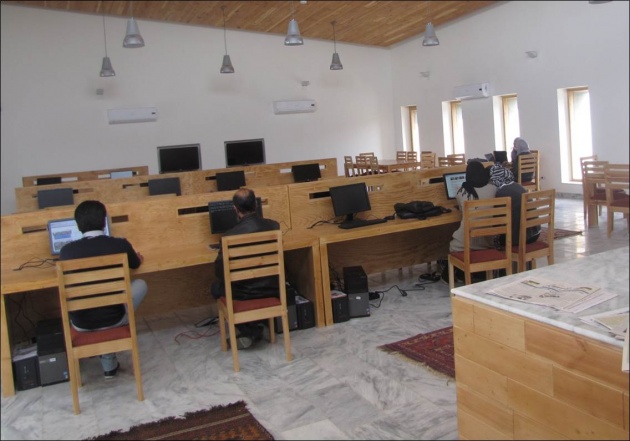
ACKU's new Reading Room is enabled with state-of-the-art IT infrastructure
The lower level features a large conference hall seating 150 with no fixed seating so that it may be used in a flexible manner for all sorts of presentations, among which will be seminars, lectures and debates. There is no shortage of imagination here at ACKU.
The major focus will be to promote a better understanding of and capacity for research. Also on the lower level are the working spaces for the librarian, the catalogers, the digitizers, the acquisitions officer, the stacks, and ABLE operations.
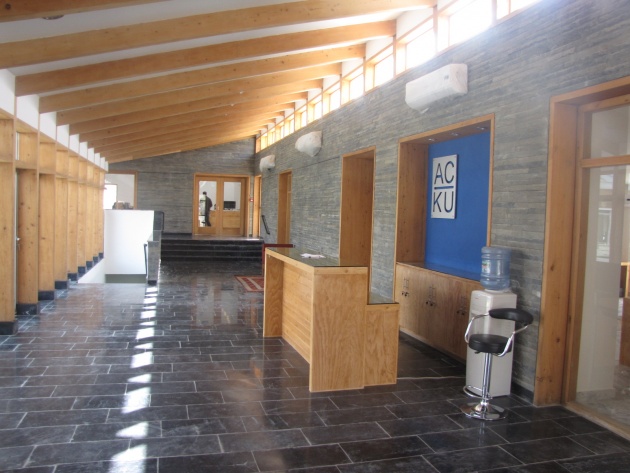
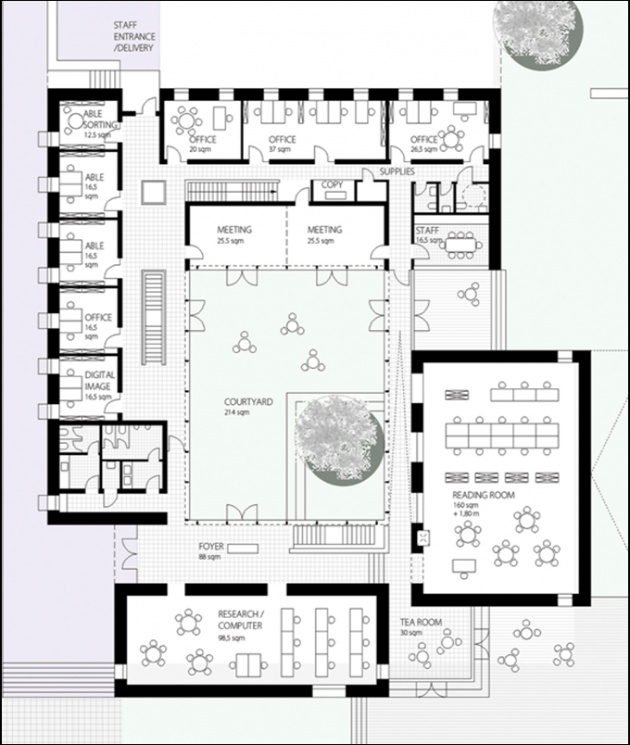
Entrance corridor of polished Maidan Shahr stone leads to ACKU's flagship Reading Room
FA: Do you plan on expanded uses of the new building and its facilities?
NHD: ACKU was built on documents and that won’t change. But documents are not the only method of sharing information. Now that we have more space, ACKU will initiate a wide-ranging agenda of seminars, workshops, conferences, exhibitions, debates, poetry-readings, musical evenings, film shows and video dialogues with students abroad.
Increased interactions between Afghan and international scholars and students will be a major objective, as will strengthening a network of government institutions, research organizations, aid workers, and academics. Through such activities, we envision that stronger links between Kabul and the provinces can be forged.
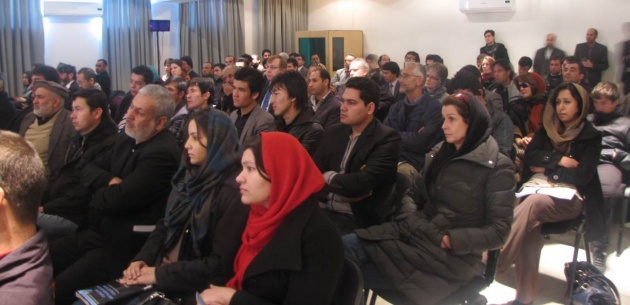
Seminars, debates and other events held in ACKU's new conference hall are already very popular
FA: The concept of physically merging the “language of architecture” with the “language of culture” to create a building that enhances education is brilliant and inspiring. We look forward to touring and maybe even professionally filming the new ACKU building someday soon!
NHD: I hope that can happen. The new ACKU building has been built for Afghanistan, and for the world. I hope that at least in a small way it will help advance through education the future peace, security and development that Afghanistan so desperately needs and deserves.
-----
This is the third in a four-part series of exclusive Women's Annex interviews with the legendary Nancy Hatch Dupree.
Part 1: Digitizing Afghanistan's Cultural Heritage
Part 2: ABLE, Afghan Education, and Self-Sufficiency
Part 4: Rebuilding Afghanistan, One Book at a Time
-----
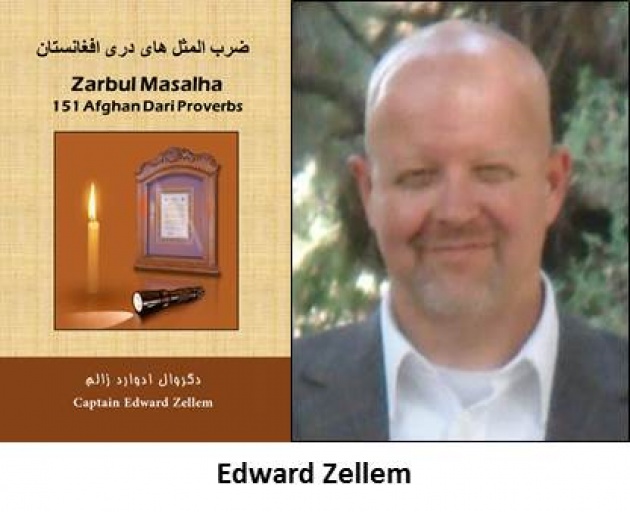 More of Edward Zellem's interviews with Afghan celebrities and thought leaders are coming soon on Women's Annex.
More of Edward Zellem's interviews with Afghan celebrities and thought leaders are coming soon on Women's Annex.
To be notified of new interviews, updates and articles, please visit here and click the green "Subscribe" button.



